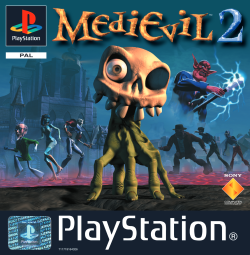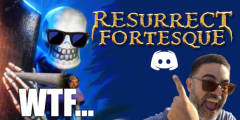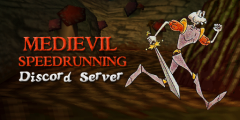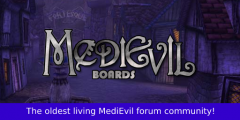MediEvil 2
MediEvil 2 (stylised as MediEvil II in North America) is an action-adventure video game and the second installment in the MediEvil series. It's a sequel to MediEvil, taking place 500 years after the game's events. It was released on April 21, 2000 in Europe and May 9, 2000 in North America.
| MediEvil 2 | ||
|---|---|---|
 PAL region cover art. | ||
| Memory Card icon | ||
| Tagline(s) | The Return of the Laughing Dead. The gothic journey to die for. | |
| Developer(s) | SCEE Cambridge Studio | |
| Publishers | Sony Computer Entertainment | |
| Platform(s) | PlayStation | |
| Release date(s) | ||
| Ratings | ||
| Mode(s) | Single-player | |
| Serials | SCES-02544 (EFG)
SCES-02545 (ISP) | |
| Previous game | MediEvil October 9, 1998 | |
| Next game | MediEvil: Resurrection September 1, 2005 | |
Gameplay
MediEvil 2 contains several of the original forms of gameplay, weaponry and graphics that were present in the first title of the series. Whilst featuring many of the classic swords and other medieval weaponry, long range weapons are more modern, taking the form of pistols, shotguns and a Gatling gun. Progress through the game is a bit more linear and story driven.
New Features
- Weapon toggle: Two weapons can be selected from the inventory, so players can easily switch between them. By default, + changes weapon.
- Camera controls: It is now possible to control the game camera with the right analog stick.
- Dan-hand: Unlocked halfway through the game, Dan can place his heads on one of the scuttling green hands in order to get into small areas to solve puzzles or access hidden treasure. Whilst in this mode, Dan can freely swap between his head and his body. This does come with risks, as Dan-hand has no attacks and is quite vulnerable. Sometimes Dan's head will be stolen by a bird on certain levels, and Dan must climb to their nest to retrieve it. While Dan's head is off, octomators can also attach themselves on top of Dan and sap his health; rapidly pressing action will shake them off. + switches between Dan and his head, or puts it back on when standing over it.
- Dankenstein: One of the levels involve Dan fighting in a boxing match, using a Monster-esque body, against a large robot. The fighters fight each other, with limbs coming off after certain amounts of damage. Up to two lost limbs can be recovered between rounds (after defeating the imps who are carrying them around). Dan will lose if he loses all his limbs, or if he is unable to defeat his opponent in three rounds.
Changes
- Linear Progression and Level Selection: There is only one choice of next level, unlike at certain points in the first game, as the game doesn't feature a map. A projector in the Professor's Lab displays a single level onto a board and the player can scroll left or right one at a time to choose a level. Sometimes new levels will start immediately after completing one without first returning to the lab. Unlike in the first game you can ask the Professor to give you a mission briefing for a level.
- Spiv: The Spiv character replaces the Merchant Gargoyles from the first game.
- Start-of-Area Saving: As some levels in the game are made-up of more than one area, Winston the Ghost will offer you the chance to save inside a new area (after a load sequence), which often occurs before boss fights, using the phrase "Alright Dan, you've come a long way. I'd save if I was you!"
- Falling Damage: Unlike in the previous game, when falling from a height Dan will now receive damage. Dan will either lose health or die instantly, depending on the height from which he falls.
Synopsis
Setting
|
Characters
- Sir Daniel Fortesque - The protagonist of the game. Hailing from the lost land of Gallowmere, Sir Dan was killed in a battle against Zarok, an insane wizard, way back in the 13th Century. Some time after Dan's death, Zarok discovered a book of Black Magic and used an ancient spell to make the dead rise from their graves to form a legion of zombie warriors. A side effect of this was that Dan also returned from his "eternal rest". Quickly realising that something was wrong, Dan embarked on a quest to destroy Zarok once and for all. Having put everything right again, Dan returned to his crypt and died. 500 years later, however, the book falls into the hands of another megalomaniac and Dan finds himself once more in the land of the living.
- Professor Hamilton Kift - A nervous, fast-talking professor in the laboratory near an unused underground rail station. He's a somewhat short man with mechanical hands and a large head. He is skilled in different forms of science, philosophy, the occult and has a knack for creating inventions. Collecting the Chalice in each level provides him the materials to create a new weapon.
- Princess Kiya - A soft spoken mummy who has been dead inside her tomb for thousands of years and enunciates every word she says carefully. She is blue in skin color and wears bandages. She knows embalming techniques and is grateful to Sir Dan for having rescued her from her eternal prison.
- Winston Chapelmount - A cheery young ghost with large eyes. His name is a play on Winston Churchill. His history creates a spectral shadow, upon which he can be called to provide help for Dan. He teaches Dan how to find and use ancient magic. He also provides save points on long levels and on a few occasions relays Dan's earned weapon to him when he is unable to access the Professor's Lab.
- Lord Palethorn - The villain of the game. His motive is to find all the lost pages of Zarok's spellbook so he can gain control of London. He was once an acquaintance of the Professor and was the one responsible for damaging his hands before being banished from the cult. He is voiced by Steven Blum.
- Mander and Dogman - Lord Palethorn's henchmen, who turned into monsters as a side-effect of their master's spell.
Plot
In 1886, 500 years after Sir Daniel Fortesque's climactic battle against the evil sorcerer Zarok, Lord Palethorn discovers some of the pages of Zarok's spell book and casts the Spell of Eternal Darkness over the city of London. However, Palethorn needs the final pages of the spell book to fully control the monsters he has spawned. The spell Palethorn casts once again brings Sir Dan, who was resting at a nearby museum, back to life. He is recruited by a professor named Hamilton Kift and his ghostly sidekick Winston to recover the missing pages of Zarok's spellbook and put a stop to Palethorn's plans. Along the way, they end up being joined by an ancient mummy princess named Kiya, whom Dan falls in love with.
When Kiya goes to Whitechapel alone to investigate psychic disturbances there, she is killed by Jack the Ripper. Broken-hearted, Dan abandons the quest against Palethorn and wanders into London's sewers, where he encounters the Mullocks, who worship him as a God, and discovers a time machine that Kift had built years earlier. Collecting the parts to rebuild the time machine, Dan travels back in time to defeat Jack and save Kiya. Jack pleads with Dan to be spared, but he mercilessly shoots him dead. Dan then merges with his past self to resolve the paradox and gains Super Armour, and returns to the battle. Dan collects the final page of the spell book and confronts Palethorn, who steals the page from him and offers Dan the choice of joining him, which Dan refuses. Palethorn then assigns his two assistants, Mander and Dogman, to stop Dan from following him, but both are killed. Dan then goes after Palethorn. Palethorn uses the spell book to summon a large blue demon. Dan manages to turn the demon against Palethorn, putting a stop to both of them. With his last breath, Palethorn drops a time bomb in a last-ditch effort to kill Dan, destroying his lair in the process.
Endings
- All chalices not collected: Sir Dan and Kiya return to the museum where they decide to re-enter their eternal rest.
- All chalices collected: Sir Dan and Kiya go for a ride on the time machine, which takes them back in time to Zarok's Lair, but also to an alternative timeline, where Palethorn had used the spell book to travel back and rewrite time to replace Zarok with himself.[12]
Development
After the success of the first MediEvil, Sony Computer Entertainment commissioned SCEE Cambridge to develop a sequel that would be released before the end of the PlayStation's lifespan. Work on the game began as early as October 1998.[13] Chris Sorrell, who previously served as the director of the first game, chose to focus on developing a new title for the PlayStation 2 instead, so the project was handed over to James Shepherd. Sorrell had a few meetings with Shepherd where he passed on some of his ideas for the game, such as setting the game in the Victorian era and using Sir Henry Fortesque, a more recently deceased descendant of Sir Dan's, as the game's protagonist. Shepherd used some of Sorrell's ideas while replacing others with his own.[14]
According to Jason Wilson, the game's lead artist, an early draft of the game's plot had previous antagonist Zarok being held prisoner in the Tower of London. Sir Daniel Fortesque's objective would have been to free him. The two of them would have had to work together in an uneasy alliance against an evil cult who would be using Zarok's spell book to resurrect the dead.[15]
During development, the Cambridge studio re-coded a majority of its core technology to ensure the sequel was "as good as possible," which Shepherd considered arguably similar to "starting from scratch."[16] Various features that were not implemented into the first game were added into MediEvil 2, like additional playable characters created by utilising Dan's skeletal form.[16]
Soundtrack
|
Promotion
|
Release
MediEvil 2 was released on April 21, 2000 in Europe and May 9, 2000 in North America. It retailed at £19.99 in the United Kingdom, being amongst the first PlayStation titles released at this lower price point.[6][17]
Reception
| Reception | |
|---|---|
| Aggregate scores | |
| Aggregator | Score |
| GameRankings | 79.47%[18] |
| Review scores | |
| Publication | Score |
| Absolute PlayStation | 79%[19] |
| Electronic Gaming Monthly | 6.8/10 |
| Game Informer | 7.75/10 |
| Game Revolution | B+[20] |
| GameSpot | 7.6/10[21] |
| Hyper | 8.5/10 |
| IGN | 8.4/10[22] |
| Official PlayStation Magazine (US) | 3.5/5 |
The game received good reviews from critics, with an 79.47% aggregate rating at Game Rankings.[18] The game was criticized by reviewers for its bad camera angles at points, difficulty and for sometimes being confusing, but was praised for its humor and approachability, among other things. IGN gave the game a score of 8.4, stating that the game "is clever, sick, and funny" and better than the first.[22] Gamespot gave it a 7.6, praising the content and features while criticising the camera.[21]
Chris Sorrell, the director of the first game, had this to say about the game: "Overall I liked most of what they came up with for M2, although I disliked the squeaky voiced helper ghost, and definitely in places the game's humour crossed a line for me from the silly/bawdy tone we had in M1 to something a little too puerile for my liking! I would also have definitely kept the Hall of Heroes since I always thought that was one of the more distinctive presentational mechanics we created in M1, oh and Dan's voice was *horrible* - incoherent mumbling was a far better way to go!"
Awards
On October 26, 2000, the game won the BAFTA Interactive Entertainment Award for Best Console Game.[23][24][25]
Re-release
|
Credits
| Producer: | Andrew Kennedy |
|---|---|
| Studio Director: | Simon Gardner |
| Creative Director: | James Shepherd |
| Lead Programmer: | Julian Rex |
| Main Programming: | James Busby, Paul Donovan, Martin Hamilton Kift, Alan McCarthy, Steven Tattersall, Iain Brown, Gavin Clarke, Gavin Bell |
| Additional Programming: | Will Bell, David Nicolier |
| Mapping: |
Gareth 'Royston' Hughes, Dave 'Dazzler' Holloway, Katie Lea, Jon Double |
| Art Design: | Jason Wilson |
| Art Management: | Nina Kristensen |
| Technical Artist: | Jason Evans |
| Lead Enviroment Artist: | Pete Giles |
| Lead Rendering Artist: | Jason Riley |
| Assistant Art Design: | Leavon Archer |
| Rendered Sequences: | Jason Riley, Phil Lukasz, Kelly Scott, Justin Summers |
| Presentation Visuals: | Jason Riley, Iwan Scheer |
| Character Animation: | Matt Bagshaw, Justin Summers, Jason Evans, Phil Lukasz, Kelly Scott, Mike Philbin, Mitch Phillips |
| Enviroment Art: | Pete Giles, Ben Levitt, Jason Evans, Theo Pantazi, Jesus Cobo, Leavon Archer |
| Character Art: | Matt Bagshaw, Jason Evans, Justin Summers, Leavon Archer |
| AV Management: | John Meegan |
| Original Soundtrack: | Andrew Barnabas, Paul Arnold |
| Sound Effects: | Paul Arnold, Andrew Barnabas |
| Video Post-Production: | Andrew Barnabas, Alex Sulman |
| Speech Post-Production: | Paul Arnold |
| Sound Effect Programming: | Gary Richards, Gavin Bell |
| Technologies Programming: | Chris Sorrell, Andrew Ostler, Julian Rex, Dean Ashton, Simon Brown, Mike Froggatt, Iain Brown |
| QA Manager (Cambridge): | Alex Sulman |
| QA Team (Cambridge): | Simon Brace, Robert King, Kieran MacDonald, Neal Radcliffe |
| QA Manager: | Geoff Rens |
| Internal Testing Manager: | Chris Rowley |
| QA Co-Ordinator: | Jim McCabe |
| Lead Testers: | Matt Ekins, Phil Green |
| Testers: | Carl McKane, Richard Bunn, Anthony Gill, Darren Perkins, John Cassidy, Miguel Sanchez |
| Copywriter: | Jim Sangster |
| Script: | James Shepherd |
| Additional Script: | Jim Sangster |
| Voice Actors: | Melanie Hudson, Marc Silk, Ben Stephens |
Gallery
|
Trivia
- According to a BBC News report from April 2000, Sony PlayStation commissioned a study about the effectiveness of teenagers learning using video games rather than books. The study was carried out by psychologist Dr David Lewis who used MediEvil 2 to test the children. The results found that more than three-quarters absorbed facts contained in a historical video game as opposed to just more than half who were presented with the same information in written form.[26]
Notes
References
- ↑ MediEvil 2 at SCEE Press Centre (archived version).
- ↑ Les jeux à venir at PlayStation Europe (archived version).
- ↑ Medievil Times. Created and distributed by Claydon Heeley Jones Mason in May 2000.
- ↑ MediEvil 2 "Need A Hand..?" promotional poster. Published by Sony Computer Entertainment in 2000.
- ↑ "We have teamed up with Sony PlayStation, the world's leading games console, to give you lucky readers the chance to win a copy of MediEvil 2 which is released in the shops today." — Win Sony PlayStation games and MediEvil 2 in The Sun. Published April 21, 2000.
- ↑ 6.0 6.1 "…MediEvil 2 comes out on Friday for £19.99 ( it's the first major title to be sold at the new price point )." — Donovan, Paul, What do I get from the following on uk.games.video.playstation. Published April 19, 2000. Retrieved July 17, 2021.
- ↑ MediEvil® II on PlayStation.com (archived version).
- ↑ MediEvil II Hits The Streets on GameInformer. Published May 9, 2000.
- ↑ MediEvil 2 on ESRB.org.
- ↑ MEDIEVIL 2 on Australian Classification. Published February 29, 2000.
- ↑ MediEvil 2 on Unterhaltungssoftware Selbstkontrolle. Published February 23, 2000.
- ↑ MediEvil developers - Q&A; on MediEvil Boards. Published February 10, 2012.
- ↑ Feature - MediEvil II Interview on Daily Radar. Published January 2000. Retrieved July 17, 2021.
- ↑ MediEvil developers - Q&A; on MediEvil Boards. Published July 23, 2013.
- ↑ MediEvil developers - Q&A; on MediEvil Boards. Published November 3, 2013.
- ↑ 16.0 16.1 Strohm, Axel, MediEvil 2 Director Interviewed on GameSpot. Published December 15, 1999.
- ↑ Bodle, Andy, Games reviews in The Guardian. Published May 11, 2000.
- ↑ 18.0 18.1 MediEvil 2 for PlayStation on GameRankings.
- ↑ MEDIEVIL 2 - Review on ABSOLUTE PLAYSTATION (archived version). Published May 2000.
- ↑ MediEvil II Review on Game Revolution. Published May 2000.
- ↑ 21.0 21.1 Fielder, Joe, MediEvil II Review on GameSpot. Published October 23, 1998.
- ↑ 22.0 22.1 Perry, Doug, Medievil II on IGN. Published May 22, 2000.
- ↑ Games - Console in 2000 on BAFTA AWARDS.
- ↑ Art and Game Design - MediEvil on JASON WILSON - PORTFOLIO.
- ↑ Interactive Entertainment Introduction on ||||| British Academy of Film and Television Arts |||||. Published December 7, 2000. Retrieved July 17, 2021.
- ↑ Video games 'valid learning tools' on BBC News. Published April 29, 2000. Retrieved June 10, 2021.
External links
- Official Website
- MediEvil 2 on TCRF.
- MediEvil 2 on the UVL.
- MediEvil 2 at Wikipedia.
| ||||||||||||||||||||||||||||||||||||||||||||||||||||||||||||||||||
Gaming Wiki Network
 Discord • X (Twitter) |
The GWN is an affiliation between independently-hosted wikis about video games. | ||
|
We are also affiliated with:
| |||





